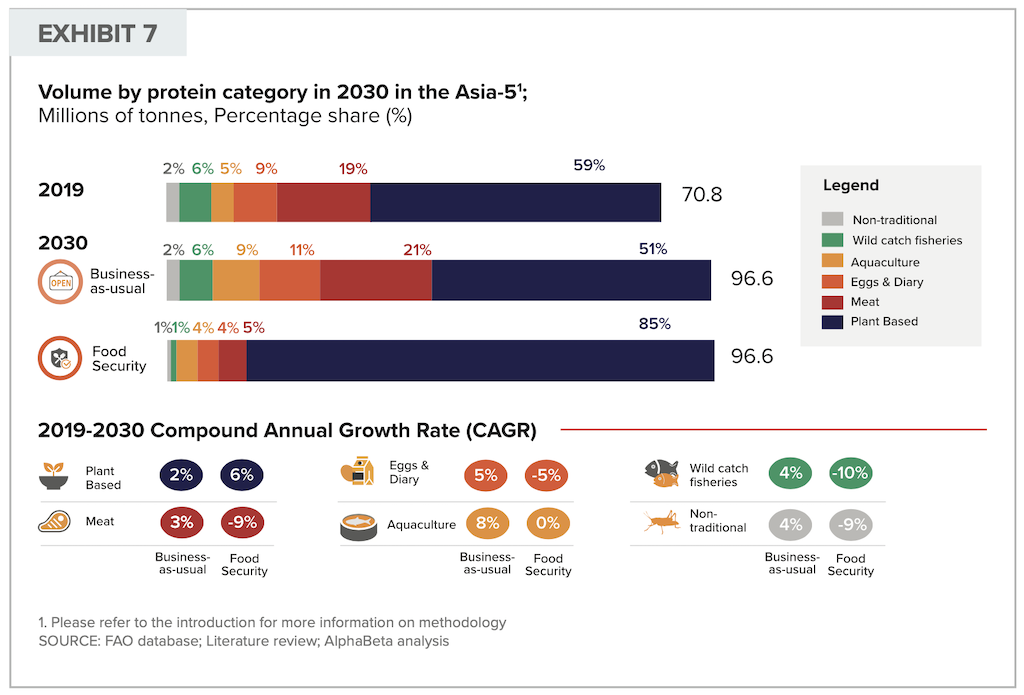4 Mins Read
Health and food security concerns will be among the top drivers of the plant-based protein shift in key Asian economies, a new report finds. Examining trends in China, Indonesia, Vietnam, Thailand, and the Philippines, the research outlines the main factors that will tip the protein scales in favour of vegan sources over traditional animal proteins.
The new report, compiled by Singapore nonprofit Food Industry Asia (FIA) and consultancy firm AlphaBeta, focuses on the changing protein landscape in the “Asia-5” countries. These five countries—China, Indonesia, Vietnam, Thailand, and the Philippines—represent the key markets at the forefront of driving the world’s rising protein demands.
Globally, protein consumption is set to grow by 45% and Asia is set to account for 63% of the demand.
Health concerns driving Asian consumer adoption
According to the report, one of the primary motivations for Asian consumers to choose plant-based proteins is health. Analysts cited growing awareness of the links between high meat intake and negative health impacts and chronic diseases.

“For instance, a consumer survey in China found that 34% of consumers reported eating less pork than in the year before…because of the meat’s perceived negative health attributes such as saturated fats, calories, and high cholesterol,” wrote the researchers.
“Additionally, a survey of urban consumers in Thailand found that 45% are looking to follow an exclusively plant-based, vegetarian, or vegan diet.”
Health-conscious consumers in the Asia-5 countries are likely to drive forward a “healthy diet” scenario, where plant-based food intake increases in line with EAT-Lancet dietary guidelines. In 2019, the EAT-Lancet outlined a “planetary health diet” that calls for a 50% reduction in red meat and sugar. It also recommended a doubling in vegetables, fruits, pulses, and nuts.
Analysts from FIA-AlphaBeta estimate that this will drive 15% growth in plant-based protein consumption by 2030, compared to a “business-as-usual” scenario.

Read: Report – plant-based meat demand in key Asian markets to grow 200% within 5 years
Policymakers to prioritise food security
The widespread adoption of plant-based proteins will also be shaped by government policy. If policymakers begin to factor in food security, supply chain resilience, and sustainability, a far greater shift towards plant-based proteins will occur in the Asia-5 markets.
Policies would include mandating local protein sourcing and developing a regulatory framework for new sustainable sources. It would also involve campaigns to drive public awareness over the health, safety, and food security advantages of non-animal-based protein. Researchers called this a “food security” scenario.

“If governments were to mandate that all protein be sourced locally and consumption of proteins in 2030 were to match the current mix of protein production in the Asia-5, there would be a significant shift towards plant-based sources of protein,” said the authors.
The authors added resource constraints imposed by intensifying climate change as a further factor driving the plant protein shift. These environmental limits will place strain on producers to shift towards climate-resilient plant protein crops, said the report.

More research and regulation needed
Concluding the research, FIA-AlphaBeta analysts say that more research and regulatory development are necessary to support the plant-forward shift.
“[It] is crucial for both producers and policymakers to prepare to meet this demand and put in place the necessary measures to ensure sustainable sources of protein supply,” commented Jiang Yifan, FIA’s head of science and regulatory affairs.
The report highlights data on nutritional benefits of plant-based proteins versus other protein sources, plant crops and species that are still not widely used, and novel cell-based proteins as key research gaps that still need to be addressed. Consumer acceptance of novel proteins is another area where more understanding is needed.
It also noted the lack of best practice standards and food safety frameworks to guide novel protein producers and “unlock new business models”, said Fraser Thompson, founder and managing director of AlphaBeta.
Lead image courtesy of OmniPork.




